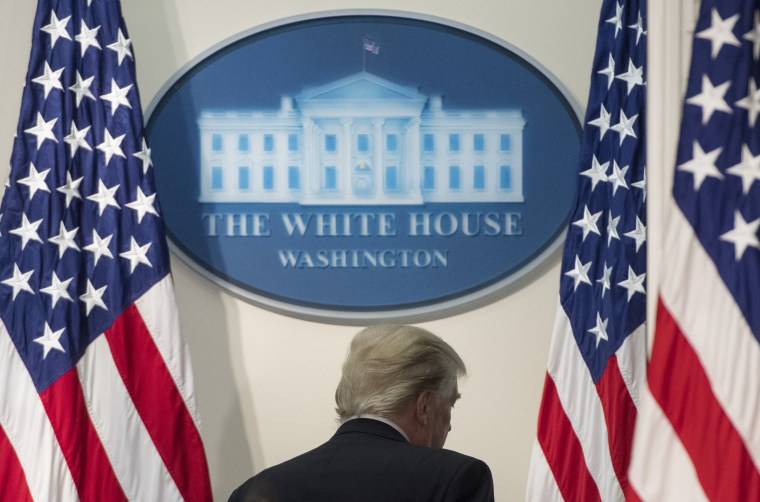There was an extraordinary moment in yesterday's White House press briefing between ABC News' Jonathan Karl and Press Secretary Sarah Huckabee Sanders. It was the kind of Q&A that simply wouldn't occur in a normal administration.
In context, much of the briefing, not surprisingly, focused on revelations that months of rhetoric -- from the president and his White House -- about the Stormy Daniels scandal was untrue. It led Karl to raise a question about "a broader view."
Q: [W]hen the president so often says things that turn out not to be true, when the president and the White House show what appears to be a blatant disregard for the truth, how are the American people to trust or believe what is said here and what is said by the president?SANDERS: We give the very best information that we have at the time.
The answer stood in stark contrast to Sanders' previous assertions that this White House "believes in making sure that information is accurate before pushing it out as fact." Had she said this again yesterday, I imagine the laughter would've been audible from great distances.
Nevertheless, her answer -- she gives "the best information" she has at the time -- was one that Sanders repeated seven times during yesterday's 20-minute briefing. It appeared to be the press secretary's way of saying that when she says things that aren't true, journalists shouldn't necessarily blame her, so much as they should blame her West Wing colleagues who mislead her.
But blame isn't really what matters here. I've watched more than my share of press briefings over the years, and I'm not sure I've ever seen an exchange quite like the one between Karl and Sanders. In this case, the White House correspondent for a major, independent news organization said, in a matter-of-fact sort of way, that the president of the United States routinely lies -- and this generated no pushback whatsoever from Trump's press secretary.
In a normal White House, a presidential spokesperson would've condemned the question as ridiculous and defended the sitting president's character and commitment to honesty. But Sanders didn't bother, probably because she knows no one would've believed her if she'd tried.
Karl's pointed question, however, wasn't the only evidence that the political world's tolerance for Trump World mendacity is reaching a breaking point. Consider some of the coverage from the last 24 hours:
* The Washington Post published an analysis that read, "Does it bother anyone that President Trump has been caught lying? Does it bother anyone that this is not new? Does it bother anyone that the president has been shown to be a liar? These questions are again front and center before the country."
* The New York Times had a related piece that told readers, "Whether called lies or misstatements, Mr. Trump's history of falsehoods has been extensively documented, but the string of factual distortions that came to light this week could come back to haunt him."
* Vox added, "With their actions, Trump and his White House have forfeited the right to have any influence on which stories about the president should or should not be believed. If they have no scruples about when and about what to lie, the only responsible alternative is to assume, always, that their statements have no relationship whatsoever to the truth."
* The editorial page of the Wall Street Journal, one of the most Republican-friendly areas in all of American print media, said yesterday, "Mr. Trump is compiling a record that increases the likelihood that few will believe him during a genuine crisis -- say, a dispute over speaking with special counsel Robert Mueller or a nuclear showdown with Kim Jong Un. Mr. Trump should worry that Americans will stop believing anything he says."
* Even Fox News' Neil Cavuto took aim at the president's "pattern of false statements."
Trump's strained relationship with the truth is not new, but these reactions to his dishonesty seemed ... different.
What's less clear is what happens now. It's possible that this week has somehow changed, in fundamental ways, how observers consider Trump's presidency and his knee-jerk dishonesty. It's also possible that this, too, shall pass, and the political world will soon revert to some detached norm that treats Trump as a semi-normal president who occasionally deserves to be trusted.
I'm hoping for the former, but I'm expecting the latter. Either way, none of this is happening in a vacuum: the White House should understand that Special Counsel Robert Mueller, federal investigators, and federal prosecutors are paying close attention. I don't know if the media will eventually shrug its collective shoulders and move on, but I have some confidence that law enforcement won't.
